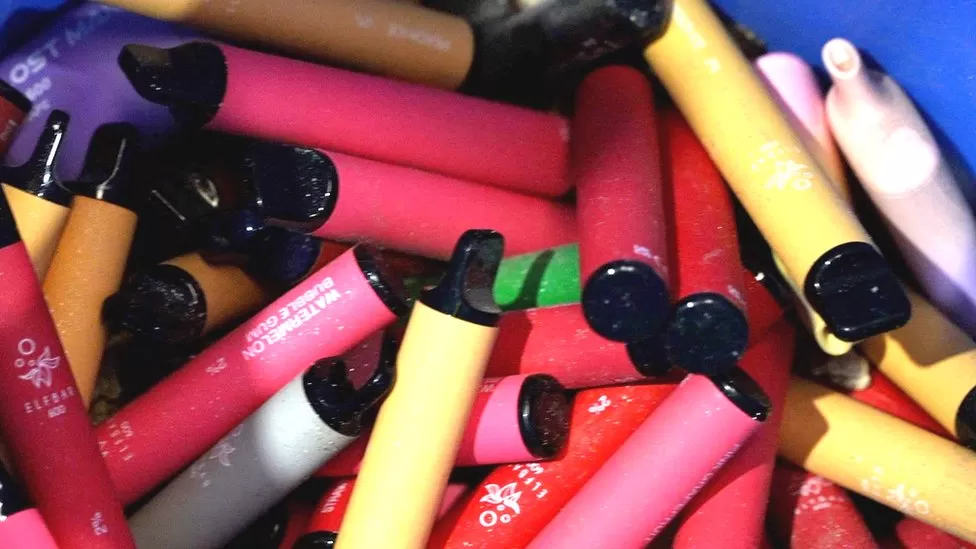Five million disposable vapes are thrown away each week in the UK, a fourfold increase over the past year, according to research from recycling campaign group Material Focus. Only 17% of vapers recycle their vapes in the correct recycling bins, the research found. Vapes can cause fires in bin lorries and waste treatment facilities if not disposed of correctly. The vaping industry says it is working to improve recycling rates. Disposable vapes, cheap plastic devices designed to give a few hundred puffs of nicotine vapor before being thrown away, are often discarded in bins and on roadsides. Material Focus, a non-profit organization that campaigns to increase recycling rates, calculated that UK adults buy around 30 million vapes a month, a huge increase that reflects the rapid growth in popularity of these products.
Disposable vapes contain copper wires and lithium batteries, which are both valuable materials. Material Focus estimates that all the disposable vapes thrown away in a year contain enough lithium to provide batteries for 5000 electric cars. They should be disposed of in decided bins, in shops or recycling centres, containing a mineral called vermiculite to reduce the risk of fires. From there, they can be taken to dedicated recycling facilities where they can be dismantled by hand. By law, everywhere that sells vapes is meant to take them back, but it’s a facility that costs money to provide, and many do not. The potential yearly cost of recycling all those vapes would be £200m, a cost which is not being met by producers, importers or retailers, they say.

“There’s far more vapes thrown on the floor, and in public bins and kitchen bins than are being recycled,” says Scott Butler, Executive Director of Material Focus. Current recycling facilities are “a long way from what we need. It needs to be as easy to recycle as it is to buy them.” Vapes that get mixed up with other household waste can cause fires in bin lorries and waste facilities. The waste company Veolia, which collects around a tenth of the UK’s waste, says lithium batteries, including vapes, cause around one fire a day in its facilities. It is illegal for under-18s to buy vapes – and the research found that young vapers are much more likely than adults to throw their vapes away or even flush them down toilets, to prevent parents finding out that they are vaping.
A spokesperson for Elfbar, the UK’s most popular disposable vape brand, said it is “fully committed to increasing rates of recycling” and working to put thousands of recycling points in place in retail outlets, and increasing the recyclability of its products. John Dunne, Director General of the UK Vaping Industry Association, said that the growth of the industry had been so rapid that it had been hard to keep up with, but many independent vape shops now had recycling facilities in place. A UK government spokesperson said: “The government is very concerned about the environmental impacts of disposable vapes and will shortly publish a response to its call for evidence on vaping which closed in June.” The Scottish Government is considering a ban on disposable vapes. In July, councils in England and Wales called for a ban, partly because of the problems they can cause in waste disposal. Material Focus’s research was based on a survey by the pollsters Yougov of 5,156 people, of whom 167 were 16 or 17 years old.
![]()





